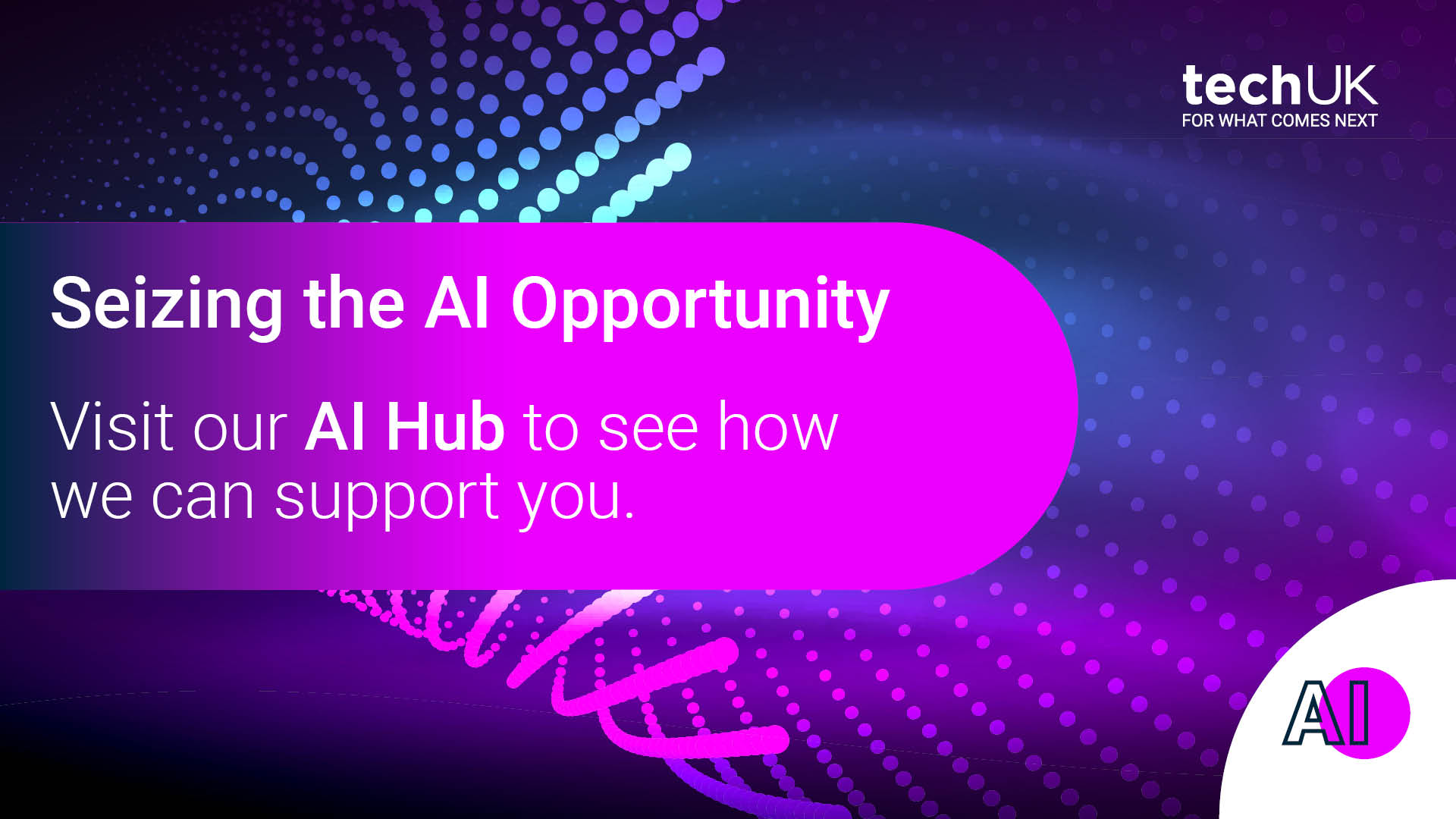techUK Roundtable: the use of Artificial Intelligence in Social Care
techUK was pleased to convene a discussion on the use of artificial intelligence in social care settings in May.
The discussion highlighted the wide variability which currently exists in terms of organisational readiness and plans for the adoption of AI-driven tools in social care settings. While some social care providers have begun to pilot or move towards formal adoption and deployment of AI-driven tools, others are only beginning to explore whether adoption could be feasible, while many organisations are not currently considering AI adoption at all. As such, uncertainty remains as to what the future of AI adoption within social care settings could practically look like on a larger scale.
The group considered examples of different applications of AI-driven tools in social care settings to date. Where AI-driven technologies have been deployed, common target outcomes include reducing hospital admissions through delivering more targeted and proactive care, for example by using AI technology to predict or detect risks to an individual’s health (such as falling or a deteriorating health status). As a result, AI-driven technologies have the potential to improve citizen health and care outcomes, support more preventative models of care and reduce pressures on health and care systems.
However, organisations considering or beginning to adopt AI-driven tools within social care settings must confront a complex and ever-evolving landscape, with numerous challenges relating to adoption feasibility (such as poor data quality, data governance structures and digitally immature systems), as well as insufficient AI literacy skills to support the initial effective commissioning, safe deployment and governance of AI.
Challenges in the social care digital landscape affect the sector’s readiness for adopting AI-driven tools
Reflections were shared on the challenges which prevent the adoption, or hinder the success of the deployment, of AI-driven technologies in social care settings.
Foundational digital infrastructure and data
The slow pace of progress in digital transformation and lack of organisational digital maturity across many social care settings are key barriers to the adoption of new and innovative emerging technologies such as AI. Poor data quality and quantities also present challenges. For example, there may be limited existing data available in a digital format, as not all social care settings have a digital social care record, or of those organisations who do, pre-existing digitised data may be lacking in standardisation and comprehensiveness. Sufficient quantities of good quality data are key factors influencing the feasibility of AI deployment and its potential effectiveness.
Interoperability
Lacking standardisation of data capture and flow, both between and within organisations, minimises the possibility of sharing and integrating data. This could limit the potential level of insight and impact offered by AI-driven tools as a result of restricted, unconnected datasets. The group recognised the significant potential value where data can be integrated across sectors (for example housing, health and social care) to develop a more granular and holistic understanding of an individual’s unique health and care needs. With legacy IT systems commonplace in many social care settings, plus an absence of interoperability standards, the potential usefulness and additional intelligence value which AI-driven tools could offer from linked, interoperable data systems and multi-sector datasets may remain out of reach for many organisations in the near future unless these barriers are addressed.
Risks of bias
Concerns regarding medical device and data biases were highlighted in the roundtable discussion. There are concerns that AI-driven tools might exacerbate pre-existing biases, for example in cases where medical devices used for remote monitoring purposes may generate inaccurate data due to devices not being designed and tested on adequately diverse populations. The group noted ongoing efforts to address these issues, including the STANDING Together project, which strives to develop standards for improving the diversity, inclusivity and generalisability of datasets destined for use by AI technologies.
Shaping the next steps for AI technology use in social care- what other action is needed?
In addition to the addressing the outstanding needs to accelerate the progress of digital transformation, transition away from legacy systems and improve interoperability and data quality within social care settings, the discussion highlighted additional areas which could support the effective consideration and deployment of AI technologies in social care settings.
Governance and guidance
The discussion underscored the absence of guidance or strategy to support decision-making, implementation and governance surrounding the use of AI technology in social care settings. Consequently, support and parameters for organisations to engage with AI-driven tools before, during or after adoption, is noticeably lacking. Should guidance and strategies be developed in future, this will need to be comprehensive enough to encompass the variety of AI models and applications in existence. Additionally, where AI technologies have already been implemented within a social care setting, should there be misalignment between pre-existing deployment and governance practices, and the content of latterly introduced guidance, it is unclear what action may be necessary to resolve such disparities. Furthermore, any guidance developed will require regular revision to ensure it remains fit for purpose given the pace of technological developments.
In cases where social care commissioners seek, or have begun, to procure new technologies such as AI, concerns were raised that a lack of awareness, education and expertise in the field of artificial intelligence (as it relates to social care) could risk a failure to conduct necessary due diligence. Such due diligence is vital to account for appropriate preparation and governance, both pre- and post-implementation of any AI tool, to ensure the safe, ethical and responsible adoption of AI technology within social care settings.
Sharing existing practice and learning lessons
The group recognised the value of sharing examples and good practice spanning contrasting social care settings and use cases in relation to the adoption of AI-based technologies. In the absence of a centralised repository to store such case studies, the sharing of experiences is currently often reliant on information cascades through personal and professional networks. Both the lack of a consolidated system for sharing adoption experiences, or a regulatory system for digital tools deployed in social care settings, could also prevent the ability to swiftly learn from shortcomings or instances of malpractice.
_________
Following the discussion, it was clear at this point in time that many more questions than answers remain outstanding in relation to the use of AI technologies applied in social care settings. Without a guiding strategy or framework to support the consideration, adoption, governance or evaluation of AI-driven tools, taken together with challenges relating to poor foundational digital infrastructure, data adequacy and shareability, in the near future the use of AI technology in social care settings will likely incur steep lessons learned. Overall, at present, the extent to which AI technology will be scaled, its oversight, and the degree to which it will shape the future of social care delivery remains to be seen.
Overcoming the existing barriers and outstanding questions regarding AI adoption and deployment in social care settings will require continued cross-sectoral collaboration, such as the discussion convened by techUK, to further examine how AI can be appropriately, responsibly and effectively applied with the intention of achieving tangible positive outcomes for people who draw on care, the social care workforce, and the wider care system.
techUK - Seizing the AI Opportunity
The UK is a global leader in AI innovation, development and adoption.
AI has the potential to boost UK GDP by £550 billion by 2035, making adoption an urgent economic priority. techUK and our members are committed to working with the Government to turn the AI Opportunities Action Plan into reality. Together we can ensure the UK seizes the opportunities presented by AI technology and continues to be a world leader in AI development.
Get involved: techUK runs a busy calendar of activities including events, reports, and insights to demonstrate some of the most significant AI opportunities for the UK. Our AI Hub is where you will find details of all upcoming activity. We also send a monthly AI newsletter which you can subscribe to here.
Upcoming AI Events
Latest news and insights
Subscribe to our AI newsletter
AI and Data Analytics updates
Sign-up to our monthly newsletter to get the latest updates and opportunities from our AI and Data Analytics Programme straight to your inbox.
Contact the team
Visit our AI Hub - the home of all our AI content:

Enquire about membership:












